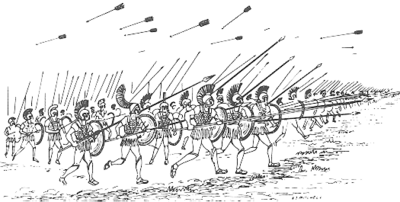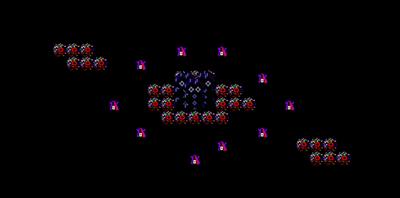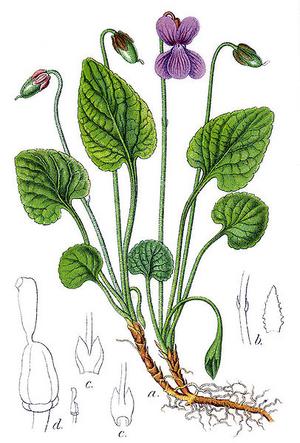>Mt.kiki No edit summary |
>Mt.kiki No edit summary |
||
| Line 30: | Line 30: | ||
[[File:Phalanx_Formation.png|thumb|400px|A soldier protects with a shield the right side of the body of the war comrade.]] | [[File:Phalanx_Formation.png|thumb|400px|A soldier protects with a shield the right side of the body of the war comrade.]] | ||
| Line 37: | Line 38: | ||
==[[Shield-Folk World]]([http://en.wikipedia.org/wiki/Phalanx_formation Phalanx formation])== | ==[[Shield-Folk World]]([http://en.wikipedia.org/wiki/Phalanx_formation Phalanx formation])== | ||
[[File:Shield-Folk(Phalanx_Formation).jpg|thumb|left|Shield-Folk(Phalanx_Formation)]] | [[File:Shield-Folk(Phalanx_Formation).jpg|thumb|left|Shield-Folk(Phalanx_Formation)]]A shield is used as a defensive symbol to the sword which symbolizes an attack. The phalanx represented in Macedonia was the troops in close formation who pile up a long spear and shield and make a rank.A soldier protects with a shield the right side of the body of the war comrade who stood in a line horizontally.Therefore, to lose a shield was made into the very dishonorable thing. Moreover, what those who accomplished the creditable battle casualty "which is shouldered on a shield and returns in triumph" were put on the shield, and the friend had them for is meant. | ||
==[[Shield-Folk World]]([http://en.wikipedia.org/wiki/Sacred_Band_of_Thebes Sacred Band of Thebes])== | |||
According to Plutarch, the 300 hand-picked men were chosen by Gorgidas purely for ability and merit, regardless of social class.<sup class="reference" id="cite_ref-devoto_17-0" sizcache05549878698924502="55 143 90" sizset="false">[http://en.wikipedia.org/wiki/Sacred_Band_of_Thebes#cite_note-devoto-17 <u>[17</u>]]</sup> It was composed of 150 pederastic male couples,<sup class="reference" id="cite_ref-ludwig_14-2" sizcache05549878698924502="55 143 91" sizset="false">[http://en.wikipedia.org/wiki/Sacred_Band_of_Thebes#cite_note-ludwig-14 <u>[14</u>]]</sup> each pair consisting of an older erastês (ἐραστής, "lover") and a younger erômenos (ἐρώμενος, "beloved").<sup class="reference" id="cite_ref-plutarchD_18-0" sizcache05549878698924502="55 143 92" sizset="false">[http://en.wikipedia.org/wiki/Sacred_Band_of_Thebes#cite_note-plutarchD-18 <u>[18</u>]]</sup> | |||
[[File:Purple_Hand.png|thumb|200px|Shield-Folk(Purple_hand)]] | |||
==[[Shield-Folk World]]([http://en.wikipedia.org/wiki/LGBT_symbols#Purple_hand Purple hand])== | |||
Inspired by [http://en.wikipedia.org/wiki/Black_Hand_(extortion) <u>Black Hand</u>] extortion methods of [http://en.wikipedia.org/wiki/Camorra <u>Camorra</u>] [http://en.wikipedia.org/wiki/Gangster <u>gangsters</u>] and the [http://en.wikipedia.org/wiki/Mafia <u>Mafia</u>],<sup class="reference" id="cite_ref-Nash_15-0" sizcache043186034609643214="61 163 175" sizset="false">[http://en.wikipedia.org/wiki/LGBT_symbols#cite_note-Nash-15 <u>[15</u>]]</sup> some gay and lesbian activists attempted to institute "purple hand" as a warning to stop anti-gay attacks, with little success. In Turkey, the LGBT rights organization MorEl Eskişehir LGBTT Oluşumu (Purple Hand Eskişehir LGBT Formation), also bears the name of this symbol.<sup class="reference" id="cite_ref-16" sizcache043186034609643214="61 163 176" sizset="false">[http://en.wikipedia.org/wiki/LGBT_symbols#cite_note-16 <u>[16</u>]]</sup> | |||
See also: [http://en.wikipedia.org/wiki/Gay_Mafia <u>Gay Mafia</u>] | |||
==[[Shield-Folk World]](the shrine of [http://en.wikipedia.org/wiki/Iolaus <u>Iolaus</u>])== | |||
[[File:The_Shrine_of_Iolaus.jpg|thumb|left|400px|The_Shrine_Of_Iolaus]]The origin of the "sacred" appellation of the Sacred Band is unexplained by Dinarchus and other historians. But Plutarch claims that it was due to an exchange of sacred vows between lover and beloved at '''the shrine of [http://en.wikipedia.org/wiki/Iolaus <u>Iolaus</u>] '''(one of the lovers of [http://en.wikipedia.org/wiki/Hercules <u>Hercules</u>]) at Thebes. He also tangentially mentions Plato's characterization of the lover as a "friend inspired of God". | |||
[[File:Viola_uliginosa_Sturm53.jpg|thumb|Shield-FolkWorld_Violets]] | |||
==Fluorescent non-NPC characters([http://en.wikipedia.org/wiki/Viola_(plant) Viola])== | |||
In addition to major symbols of the LGBT community, less-popular symbols have been used to represent members’ unity, pride, shared values, and allegiance to one another. | |||
Bisexual women and lesbians used to give [http://en.wikipedia.org/wiki/Viola_(plant) <u>violets</u>] to the woman they were wooing, symbolizing their "Sapphic" desire. In a poem, [http://en.wikipedia.org/wiki/Sappho <u>Sappho</u>] described herself and a lover wearing garlands of violets. The giving of violets was popular from the 1910s to the 1950s.<sup class="reference" id="cite_ref-40" sizcache023109262553286636="61 163 342" sizset="false">[http://en.wikipedia.org/wiki/LGBT_symbols#cite_note-40 <u>[40]</u>]</sup> | |||
http://en.wikipedia.org/wiki/LGBT_symbols#Other_symbols | |||
==fluorescent non-NPC characters([http://en.wikipedia.org/wiki/HOMO HOMO])== | |||
HOMO and '''LUMO''' are [http://en.wikipedia.org/wiki/Acronym <u>acronyms</u>] for '''highest occupied [http://en.wikipedia.org/wiki/Molecular_orbital <u>molecular orbital</u>]''' and '''lowest unoccupied molecular orbital''', respectively. The energy difference between the HOMO and LUMO is termed the HOMO-LUMO gap. HOMO and LUMO are sometimes referred to as '''frontier orbitals'''.<sup class="reference" id="cite_ref-1" sizcache0625527419607367="75 172 12" sizset="false">[http://en.wikipedia.org/wiki/HOMO#cite_note-1 <u>[1]</u>]</sup> | |||
Revision as of 05:43, 7 February 2013
Shield-Folk World(Phalanx formation)
A shield is used as a defensive symbol to the sword which symbolizes an attack. The phalanx represented in Macedonia was the troops in close formation who pile up a long spear and shield and make a rank.A soldier protects with a shield the right side of the body of the war comrade who stood in a line horizontally.Therefore, to lose a shield was made into the very dishonorable thing. Moreover, what those who accomplished the creditable battle casualty "which is shouldered on a shield and returns in triumph" were put on the shield, and the friend had them for is meant.
Shield-Folk World(Sacred Band of Thebes)
According to Plutarch, the 300 hand-picked men were chosen by Gorgidas purely for ability and merit, regardless of social class.[17] It was composed of 150 pederastic male couples,[14] each pair consisting of an older erastês (ἐραστής, "lover") and a younger erômenos (ἐρώμενος, "beloved").[18]
Shield-Folk World(Purple hand)
Inspired by Black Hand extortion methods of Camorra gangsters and the Mafia,[15] some gay and lesbian activists attempted to institute "purple hand" as a warning to stop anti-gay attacks, with little success. In Turkey, the LGBT rights organization MorEl Eskişehir LGBTT Oluşumu (Purple Hand Eskişehir LGBT Formation), also bears the name of this symbol.[16] See also: Gay Mafia
Shield-Folk World(the shrine of Iolaus)
The origin of the "sacred" appellation of the Sacred Band is unexplained by Dinarchus and other historians. But Plutarch claims that it was due to an exchange of sacred vows between lover and beloved at the shrine of Iolaus (one of the lovers of Hercules) at Thebes. He also tangentially mentions Plato's characterization of the lover as a "friend inspired of God".
Fluorescent non-NPC characters(Viola)
In addition to major symbols of the LGBT community, less-popular symbols have been used to represent members’ unity, pride, shared values, and allegiance to one another.
Bisexual women and lesbians used to give violets to the woman they were wooing, symbolizing their "Sapphic" desire. In a poem, Sappho described herself and a lover wearing garlands of violets. The giving of violets was popular from the 1910s to the 1950s.[40]
http://en.wikipedia.org/wiki/LGBT_symbols#Other_symbols
fluorescent non-NPC characters(HOMO)
HOMO and LUMO are acronyms for highest occupied molecular orbital and lowest unoccupied molecular orbital, respectively. The energy difference between the HOMO and LUMO is termed the HOMO-LUMO gap. HOMO and LUMO are sometimes referred to as frontier orbitals.[1]






